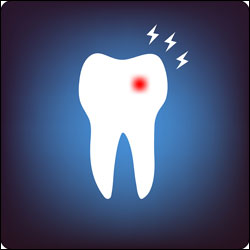At one time or another, you’ve probably experienced a sharp, sudden tooth pain. This is known as tooth sensitivity, or dentin hypersensitivity, and is one of the most common complaints among dental patients. Are your sensitive teeth simply an annoyance, or could it be a sign of something more serious?
Before we examine the causes of tooth sensitivity, let’s first understand the structure of a tooth. The outermost layer of a tooth is called the enamel, a protective covering that envelopes the inner tooth surface known as the dentin. Beneath the dentin and in the center of the tooth are living tissues; this is known as the pulp. The pulp contains sensitive nerves, which are connected to the dentin. When dentin is exposed, the nerves are easily stimulated which results in discomfort and pain.

People with sensitive teeth generally experience discomfort when a hot, cold, sweet or sour food or beverage comes into contact with the exposed dentin and irritates the nerves. The sensation can range from slight irritation to excruciating pain.
One or combinations of the following are common causes of tooth sensitivity.
- Overly abrasive toothpaste
- Receding gums
- Brushing too vigorously or using a hard-bristled toothbrush
- Cracked teeth
- Teeth grinding or clenching
- Tooth decay
- Enamel wear caused by acidic foods or drinks, such as soda
- Eating disorders
- Root nerve damage
- Teeth whitening products
- Dental procedures such as cleanings, crowns or root canals
Not all occasional tooth sensitivity warrants a trip to the dentist, but when tooth sensitivity persists, talk to Dental Dimensions. A more serious issue, such as gum disease, that requires professional treatment may be causing your discomfort. Your San Jose dentist will assess the severity of your tooth sensitivity, determine the cause of your pain and recommend the best course of treatment to relieve your discomfort.


